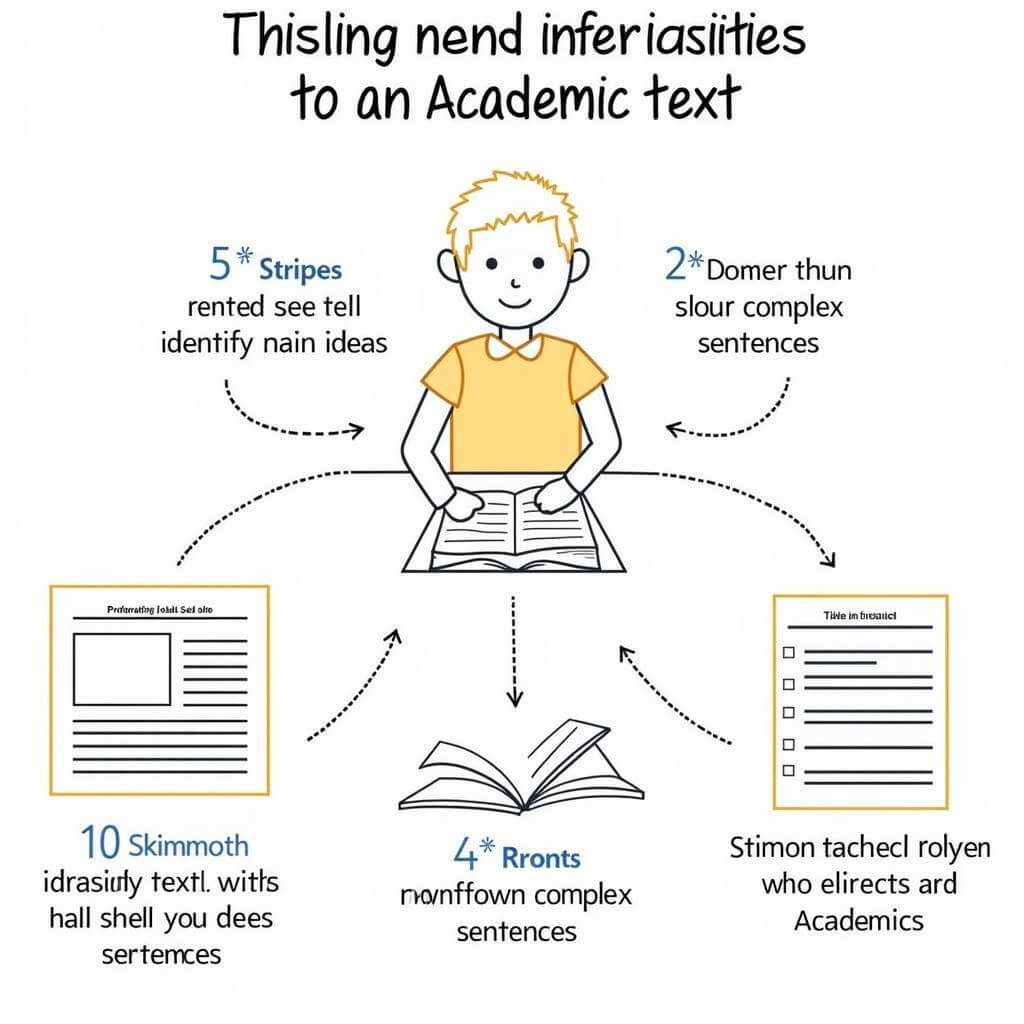Academic texts can be intimidating, especially when preparing for the IELTS exam. However, with the right strategies and mindset, you can approach these challenging passages with confidence. This comprehensive guide will equip you with effective techniques to tackle academic texts and boost your IELTS reading performance.
Understanding the Nature of Academic Texts
Academic texts in IELTS are designed to test your ability to comprehend complex information quickly and accurately. These passages often contain:
- Specialized vocabulary
- Dense information
- Abstract concepts
- Intricate arguments
Recognizing these characteristics is the first step towards handling challenging academic passages effectively.
Developing a Strategic Approach
To deal with academic texts confidently, you need a well-structured approach. Here’s a step-by-step strategy:
- Skim the text for an overview
- Identify the main idea and supporting points
- Break down complex sentences
- Use context clues to understand unfamiliar words
- Take concise notes
- Practice active reading techniques
Dr. Emma Thompson, a renowned IELTS expert, emphasizes: “The key to mastering academic texts is not just understanding the content, but also developing a systematic approach to tackle them efficiently.”

Enhancing Vocabulary for Academic Texts
A robust vocabulary is crucial for dealing with academic texts confidently. Here are some effective ways to expand your academic vocabulary:
- Create a personal glossary of academic terms
- Study academic word lists
- Read widely in various academic disciplines
- Use vocabulary in context through writing and speaking
Remember, it’s not just about knowing more words, but understanding how they’re used in academic contexts.
Improving Comprehension Skills
To truly master academic texts, you need to improve your understanding of complex texts. Try these techniques:
- Practice summarizing paragraphs in your own words
- Identify the author’s purpose and tone
- Look for patterns and relationships within the text
- Analyze the text structure (e.g., compare and contrast, cause and effect)
Prof. James Wilson, an IELTS reading specialist, advises: “Don’t just read passively. Engage with the text by questioning and analyzing the information presented.”
Time Management Strategies
Dealing with academic texts confidently also means managing your time effectively during the IELTS reading test. Consider these tips:
- Allocate specific time for each passage
- Use the difficulty level to guide your time distribution
- Practice with timed exercises regularly
- Learn when to move on from challenging questions
Remember, it’s better to attempt all questions than to spend too much time on a single difficult passage.
Dealing with Dense Academic Passages
Some academic texts in IELTS can be particularly dense and challenging. To deal with dense academic passages effectively:
- Break the text into smaller, manageable chunks
- Focus on topic sentences and concluding sentences
- Use visualization techniques to represent complex ideas
- Practice paraphrasing difficult sections
Dr. Sarah Lee, IELTS preparation expert, notes: “The ability to simplify complex information is a valuable skill not just for IELTS, but for academic success in general.”
Handling Abstract Concepts
Academic texts often contain abstract ideas that can be challenging to grasp. To deal with IELTS reading questions on abstract topics:
- Look for concrete examples within the text
- Relate abstract concepts to real-world scenarios
- Use mind mapping to visualize relationships between ideas
- Practice discussing abstract topics to enhance understanding
Addressing Short Answer Questions
Many academic texts in IELTS are followed by short answer questions. To deal with IELTS reading short answer questions effectively:
- Read the questions before tackling the passage
- Locate relevant information quickly using skimming and scanning
- Pay attention to word limits in your answers
- Use synonyms and paraphrasing to avoid copying directly from the text
Building Confidence Through Practice
Confidence in dealing with academic texts comes with consistent practice. Here are some ways to build your skills:
- Read academic articles from reputable sources daily
- Take timed practice tests regularly
- Join study groups to discuss challenging texts
- Seek feedback from teachers or experienced IELTS takers
Conclusion
Mastering the art of dealing with academic texts confidently is a crucial skill for IELTS success. By implementing these strategies and consistently practicing, you’ll develop the confidence and competence to tackle even the most challenging academic passages. Remember, the key is to approach each text systematically, manage your time effectively, and continuously expand your academic vocabulary and comprehension skills.
FAQs
-
How can I improve my reading speed for academic texts?
Practice timed reading exercises regularly and focus on improving your skimming and scanning techniques. -
What should I do if I encounter unfamiliar words in an academic passage?
Use context clues to guess the meaning, and if time allows, break down the word into root, prefix, and suffix to deduce its meaning. -
How can I stay focused when reading long academic texts?
Break the text into smaller sections, take short breaks between passages, and actively engage with the content through note-taking or summarizing. -
Is it necessary to understand every word in an academic text?
No, focus on grasping the main ideas and key supporting details rather than understanding every single word. -
How can I improve my ability to identify the main idea of an academic passage?
Practice summarizing paragraphs and entire passages in one sentence, focusing on the author’s primary argument or purpose. -
What’s the best way to prepare for academic reading in IELTS?
Regularly read a variety of academic texts, practice with past IELTS papers, and work on expanding your academic vocabulary. -
How can I maintain confidence when facing a particularly challenging academic text?
Remember your preparation, take a deep breath, and approach the text systematically using the strategies you’ve practiced. Confidence comes from being well-prepared and having a solid approach.